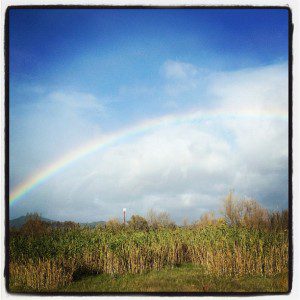
Genesis 15:1-12, 17-18; Psalm 27; Philippians 3:17-4:1; Luke 13:31-35
The Quakers have a saying “a way will be made.” A variation of this is the affirmation that “God makes a way where there is no way.” Out of apparent scarcity, abundance emerges. Where there appears to be a dead end, a path appears. When we hit bottom, we discover God is with us and we can, with God’s companionship and inspiration, climb out of the mess in which we’ve found ourselves. When think we are unlovable or will never find a loving friendship or partner, we have a synchronous meeting and everything changes.
There are no guarantees that Christians and people of other spiritual traditions will have an easy go of it. We do not “create our own realities,” as some new age thinkers suggest, although our actions and beliefs help shape our realities. We do not “name it and claim,” as the prosperity gospel asserts, although our faith opens doors and windows for us. Life is too complicated and causation too intricate to heap praise or blame, success or failure, based purely on individual efforts or attitudes. Still, we discover a highway in the desert, a path in the wilderness, a polestar on the darkest night. A way will be made.
That was the experience of Abraham and Sarah. In their time, immortality was primarily biological. They believed that we live on in our children and children’s children. We pass on our history, experiences, and memory. To die childless is to be unfulfilled regardless of your other achievements.
Abraham and Sarah had followed God, leaving their familiar home for the promise of a new land. They had dreamed of children to populate the land and be the companions of their old age. But, still they have no children. They were desperate and wondered if God’s promises could be trusted.
In the midst of his despair about the future, Abram (Abraham) has a vision in which God shows him descendants as numerous as the stars in the sky. It is an improbable promise to an aged couple. God gives Abraham and Sarah a vision of a new land that they come to possess. Abraham is terrified, at first, because the Holy One has passed by; he is also shaking at the possibility that his dreams will come true. A child will be born, a future promised, and a nation will burst forth out of nothing. A way will be made!
Psalm 27 promises the same thing – a sense of security and well-being –despite conflict and threat. “The LORD is my light and my salvation; whom shall I fear? The LORD is the stronghold of my life; of whom shall I be afraid?” Fear is epidemic in our time and some of it is justified, but being controlled by fear won’t get us to the next step. Congregations are fearful of the future as they look at the changing face of North America, the growing pluralism and the post-Christian ethos, along with shrinking memberships, budget deficits, and aging demographics. The old ways are in transition and no one has more than a clue to the pathway toward the future.
Many congregations, like the widow of Zarapheth, are counting the days and years till their demise, and in focusing on a fearful future, cutting off possibilities for new life around them. (I Kings 17:7-16) Still, a way is made for her by the simple act of sharing a meal. Her generosity connects her and her son with a wellspring of blessing that enables them to survive the famine. In her own Eucharistic feeding, she discovers she is not alone, but has resources beyond her imagination. Abundant living and trust connect, scarcity thinking isolates and contracts.
A way is made for those who push toward a heavenly goal. They experience a deeper realism than the “earthly minded,” Paul describes in Philippians. They see a great plant in a mustard seed and a multitude fed by five loaves and two fish. They see resurrection beyond tragedy and promise in unexpected people. Realism dictates that we recognize the bottom line, but a deeper realism imagines a great plant coming from the smallest seed and the gift of a small child multiplying to feed a crowd. Who knows how? But, there are realities beyond the present moment that lure us toward the future.
A way is made and Jesus mourns that Jerusalem has closed itself off to the future, turning away from the provocative alternative vision he presents to them. Opening to abundance, having a transformed life, makes a way where there is no way and awakens us to a world in which God is present in the challenges of life. Let the words of the United Church of Canada’s New Creed be our blessing this week:
We are not alone,
we live in God’s world.
We believe in God:
who has created and is creating,
who has come in Jesus,
the Word made flesh,
to reconcile and make new,
who works in us and others
by the Spirit.
We trust in God.
We are called to be the Church:
to celebrate God’s presence,
to live with respect in Creation,
to love and serve others,
to seek justice and resist evil,
to proclaim Jesus, crucified and risen,
our judge and our hope.
In life, in death, in life beyond death,
God is with us.
We are not alone.
Thanks be to God.
Yes, thanks be to God for abundance, wonder, and beauty bursting forth in a world of limitations.













